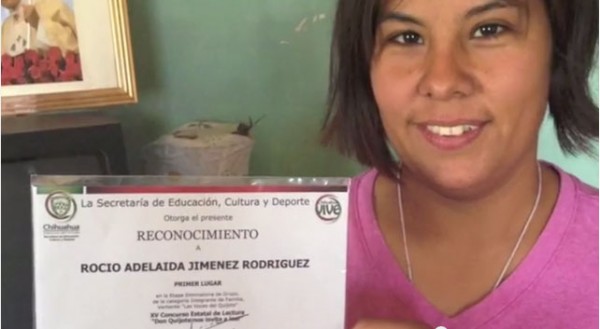CIUDAD JUAREZ — Rocio Jiménez, 31, lives in colonia La Cuesta, one of the poorest sections of this city, in a small two-bedroom house with her husband and six-year-old son. Although she seems to have a normal life, Jiménez has suffered since childhood from disabilities caused by meningitis.
The illness left her unable to learn to communicate clearly, but determined to improve her life, she finally learned to read and write when she turned 30. Jiménez never asked for help, but she was determined to overcome adversity, said her mother, Irma Rodriguez, who describes Jiménez as courageous and stubborn.
Meningitis is an inflammation of the tissues that surround the brain or spinal cord. According to the National Meningitis Association, adolescents and young adults have an increased susceptibility to meningococcal disease, accounting for 15 percent of all cases. One of seven cases among adolescents will result in death.
Rosario Adame, a general medical practitioner said, “meningitis is an inflammation of the meninges that damages some parts of the brain. When it evolves and it is not well treated, it can damage some parts of the brain depending on where it originated.”
According to the World Health Organization, even when the disease is diagnosed early and adequate treatment is started, 5 percent to 10 percent of patients die, typically within 24 to 48 hours after the onset of symptoms.
Adame said that meningitis can affect newborns as well as adults. Some early symptoms are severe fever and neck stiffness that can lead to seizures.
Jiménez was diagnosed with meningitis after receiving medical care for a fall when she was one year old. She had a severe fever and seizures. Her mother gave her a medication for the fever and took her to the doctor. After the doctor treated her daughter, he told Rodriguez that she had saved Jimenez’ life.
According to Adame, “when the disease starts, it can be a side-effect to a low immune level, exposed pharyngitis, gastroenteritis or some type of tuberculosis. It is transmitted like any other bacterial infection due to poor hygiene, neglect of not washing your hands and coughing.”
Jiménez was lucky to have survived with the ability to lead a normal life. One in five patients who survive meningitis suffer permanent disabilities, such as brain damage, hearing loss, loss of kidney function or limb amputations.
“It may leave effects in the areas of speech or motor, which is the front part of the brain,” Adame said.
After being diagnosed with meningitis, the doctor told Rodriguez that Jiménez was going to have a hard time learning how to walk and talk again. He estimated two to three years for her to walk. Rodriguez took Jiménez to places where they gave her exercises to improve her vision and motor skills. She was determined to improve her daughter’s life.

Rocío Jimenez participated in a storytelling competition, “Don Quijote nos invita a leer”, that helped her improved her language and reading skills. Photo credit: Karina Moreno
“Rocio did her exercises at the center and at home. She never asked for help and she quickly improved,” her mother said with tears in her eyes.
Nine months later, when Rodriguez took her daughter to a doctor’s appointment the doctor was surprised to see Jiménez walking without assistance. The doctor couldn’t understand how Jiménez was walking on her own and asked Rodriguez what she had given her.
“God’s will and her determination were responsible for her success,” was Rodriguez’ response.
When Jiménez started kindergarten, her mother had to take her to a special needs school where they could continue to help her daughter improve her learning skills. “She couldn’t handle a normal school. She was a victim of bullying,” Rodriguez said.
Jiménez attended special schools where she underwent therapy sessions to improve her vision, language and motor skills. Jiménez and her mother had to leave their house by six in the morning to arrive at eight. While her daughter was in school, Doña Irma looked for jobs as a housekeeper in the school area.
When Jiménez was in middle school, one of the social workers told Rodriguez that Jiménez would never learn how to read or write. Rodriguez didn’t let these negative comments get to her.
“If I had to take Rocio all the way to hell and back, I was going to do that for the sake of my daughter’s life,” Rodriguez said.
Jiménez tried living a normal life by participating in extracurricular activities held in her school, such as sewing classes and arts and crafts, but still was unable to read or write.
When Jiménez was 17 she got married. She met her husband at the special middle school she attended.
The birth of her son led her to learn how to read and write. Her son’s kindergarten teacher, Iliana Crespo, encouraged Jiménez to participate in a storytelling competition, “Don Quijote nos invita a leer.” She participated in the contest and improved her language and reading skills.
“When Rocio started to read on her own in the competition everyone was amazed and when she finished the judges stood up to applaud her achievement,” Crespo said.
Jiménez is very involved in her child’s life and participated as the librarian at her son’s school. She took care of the books and made weekly reports.
Jiménez is expecting her second child, a girl and she said she continues to practice her reading skills with her son’s new teacher to support her children and help them with their academic life.

